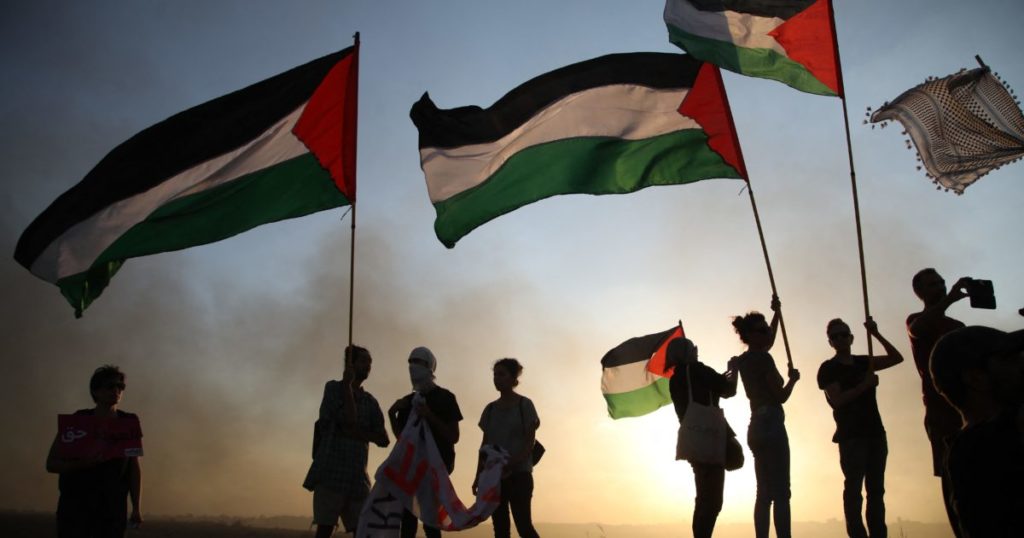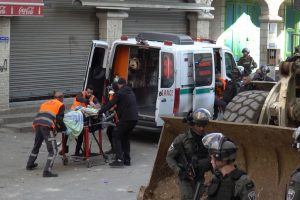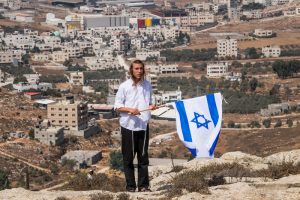https://www.eccpalestine.org/letter-to-ursula-von-der-leyen-concerning-the-statement-issued-on-israels-independence-day Posted in Statements | 8 May 2023
LETTER TO URSULA VON DER LEYEN CONCERNING THE STATEMENT ISSUED ON THE 75TH ANNIVERSARY OF THE ESTABLISHMENT OF THE STATE OF ISRAEL.
ECCP letter to Ursula von der Leyen concerning the statement issued on the 75th anniversary of the establishment of the State of Israel.
To the attention of Ursula von der Leyen, President of the European Commission
Dear Ms. von der Leyen,
We, a coalition of 42 European organisations, write to express our deep concern and, frankly speaking, our anger, regarding your statement issued on the 75th anniversary of the establishment of the State of Israel.
Your statement ignored the historical fact that the State of Israel was founded on the ethnic cleansing of two thirds of the indigenous Palestinian people between 1947 and 1949. This fact has been well documented by Palestinian and Israeli historians and researchers. Palestinians commemorate this period as the Nakba (‘catastrophe’ in Arabic) that marks the beginning of the process of planned dispossession and expulsion of the majority of the Palestinian people.
More than 500 towns and villages were systematically destroyed and depopulated by massacre and mass expulsion. As a result more than 750,000 Palestinians were forcibly exiled and became refugees. Many of those refugees and their descendants still languish in impoverished refugee camps, denied their inherent and UN-stipulated right of return after 75 years. This dispossession process, what Palestinians call the “ongoing Nakba” has never ended. It continues today, as Israel continues to occupy and annex Palestinian land, steal resources, demolish homes, schools and hospitals, and arbitrarily arrest, injure and kill Palestinians, including women and children.
By omitting facts and by blindly adopting the narrative of Israel, you erase the history, memory and rich culture of the Indigenous Palestinian people, with their diversity, who have inhabited Palestine for centuries. By endorsing the narrative that “Israel made the desert bloom” you replace history with myth, employing a colonial trope that attempts to ‘greenwash’ Israel’s settler colonial and apartheid regime over the Indigenous Palestinian people. Such ignorance is not expected from the president of the European Commission.
Since the beginning of 2023, the world has again witnessed an increase in Israeli attacks on Palestinians, including military raids carried out by the Israeli military in the West Bank cities of Jenin, Jericho and Nablus. These preceded the pogrom in Huwara and its neighbouring villages and the violent raid on worshippers in the Al Aqsa mosque during the month of Ramadan just three weeks before your statement. Is this the country you praise for its “dynamism” and shared “culture and values”?
It is painful to hear you praise “the 75 years of dynamism, ingenuity, and ground-breaking innovations” of a state that imposes a repressive, racist, and brutally violent settler-colonial policy on a population that it subjugates and controls. Israel’s regime of control over the Palestinian people is increasingly recognised as constituting apartheid by major human rights organisations, including Israeli human rights organisations. True, Israel has developed “a dynamic, ingenious and ground-breaking” technology in the field of military, cyber warfare, spyware, disinformation and election rigging by using the captive Palestinians under its control as test objects. Israel is one of the world’s leading exporters of these destructive high-tech products, with its military and “security” exports enabling dictatorships and authoritarian regimes worldwide to perpetrate grave human rights violations.
Your racist statement not only betrays historical facts and reality on the ground, but also directly contradicts internationally accepted principles and norms and the very values on which the EU is based. By ignoring the existence of the Palestinian people who have lived under decades of Israeli oppression or enforced exile, you ignore their right to self-determination, an inalienable right enshrined in the UN charter.
In December 2022 the United Nations General Assembly adopted a resolution to commemorate the Palestinian Nakba. This historic resolution, although shamefully only supported by two EU member states, acknowledges the 75 years of injustice inflicted upon Palestinian people. As the president of the European Commission, an institution that claims to uphold international law and the authority of the UN, you cannot sideline the decisions of the UN General Assembly.
On May 9th the EU will celebrate Europe Day, which Palestinians are boycotting this year because of your statement. We sincerely hope that this celebration may be in the spirit of recognising, and repenting for, the past racist and colonial history of EU countries, and that Europe Day will celebrate the UN charter which ensued from this history. That would obviously imply that the EU would stop paying service in words and in deeds to the values and policies of Israel, which itself rejects in words and in deeds the common UN charter.
Palestinian civil society organisations, as well as the Palestinian Authority, have vehemently denounced your statement. Amnesty International has also criticised the statement, and urged you to recognise that Israel is committing the crime against humanity of apartheid. We, in the European civil society, wholeheartedly echo them.
We demand that you retract your statement, and issue an apology to the Palestinian people for publicly erasing their culture, history and civilisation, as well as turning a blind eye to the violations currently being committed against their inalienable rights.
We demand that the EU publicly recognises that Israel is committing the Crime of Apartheid, and that EU institutions act to immediately end all complicity in the commission of this crime. We also kindly request that you answer this letter.
LETTERA A URSULA VON DER LEYEN IN MERITO ALLA DICHIARAZIONE RILASCIATA IN OCCASIONE DEL 75° ANNIVERSARIO DELLA COSTITUZIONE DELLO STATO DI ISRAELE.
Pubblicato /Dichiarazioni | 8 maggio 2023
Lettera dell’ECCP a Ursula von der Leyen in merito alla dichiarazione rilasciata in occasione del 75° anniversario della fondazione dello Stato di Israele.
All’attenzione di: Ursula von der Leyen, Presidente della Commissione Europea
Gentile signora von der Leyen,
Noi, una coalizione di 42 organizzazioni europee, scriviamo per esprimere la nostra profonda preoccupazione e, francamente, la nostra rabbia, in merito alla sua dichiarazione rilasciata in occasione del 75° anniversario della fondazione dello Stato di Israele.
La sua dichiarazione ha ignorato il fatto storico che lo Stato di Israele è stato fondato sulla pulizia etnica di due terzi del popolo palestinese indigeno tra il 1947 e il 1949. Questo fatto è stato ben documentato da storici e ricercatori palestinesi e israeliani. I palestinesi commemorano questo periodo come la Nakba (“catastrofe” in arabo) che segna l’inizio del processo di espropriazione pianificata ed di espulsione della maggioranza del popolo palestinese.
Più di 500 città e villaggi furono allora sistematicamente distrutti e spopolati con massacri ed espulsioni di massa. Di conseguenza più di 750.000 palestinesi furono esiliati con la forza e divennero profughi. Molti di quei rifugiati e dei loro discendenti languono ancora in campi profughi impoveriti, e gli è stato negato il diritto al ritorno un diritto intrinseco e sancito dalle Nazioni Unite dopo 75 anni. Questo processo di spoliazione, quello che i palestinesi chiamano la “Nakba in corso”, non è mai terminato. Continua oggi, mentre Israele continua ad occupare e annettere terra palestinese, rubare risorse, demolire case, scuole e ospedali e arrestare, ferire e uccidere arbitrariamente palestinesi, comprese donne e bambini.
Omettendo i fatti storici e adottando ciecamente la narrazione di Israele, lei cancella la storia, la memoria e la ricca cultura del popolo indigeno palestinese, con la sua diversità, e che ha abitato la Palestina per secoli. Sostenendo la narrazione secondo cui “Israele ha fatto fiorire il deserto”, sostituisci la storia con il mito, impiegando un “tropo“ coloniale che tenta di “rinverdire” il regime coloniale e di apartheid dei coloni israeliani sul popolo indigeno palestinese. Non ci si aspetta una tale ignoranza dal presidente della Commissione europea.
Dall’inizio del 2023, il mondo ha nuovamente assistito a un aumento degli attacchi israeliani contro i palestinesi, compresi i raid militari effettuati dall’esercito israeliano nelle città della Cisgiordania di Jenin, Gerico e Nablus. Questi hanno preceduto e seguito il pogrom a Huwara e nei villaggi vicini e il violento raid contro i fedeli nella moschea di Al Aqsa durante il mese di Ramadan, avvenuto appena tre settimane prima della sua dichiarazione. È questo il Paese che lei loda per il suo “dinamismo” e per la sua “cultura e per valori” condivisi?
È doloroso sentirla elogiare “i 75 anni di dinamismo, ingegnosità e innovazioni pionieristiche” di uno stato che impone una politica coloniale repressiva, razzista e brutalmente violenta su una popolazione che soggioga e controlla. Il regime di controllo di Israele sul popolo palestinese è sempre più riconosciuto come costitutivo dell’esercizio di apartheid da parte delle principali organizzazioni per i diritti umani, comprese le organizzazioni israeliane per i diritti umani. È vero, Israele ha sviluppato una tecnologia “dinamica, ingegnosa e rivoluzionaria” nel campo dell’esercito, della guerra informatica, dello spyware, della disinformazione e dei brogli elettorali usando i palestinesi prigionieri sotto il suo controllo come cavie. Israele è uno dei principali esportatori mondiali di distruttivi prodotti ad alta tecnologia, con le sue esportazioni militari e di “sicurezza” che consentono a dittature e regimi autoritari in tutto il mondo di perpetrare a loro volta gravi violazioni dei diritti umani.
La sua dichiarazione razzista non solo tradisce i fatti storici e la realtà sul campo, ma contraddice anche direttamente i principi e le norme accettate a livello internazionale e gli stessi valori su cui si basa l’UE. Ignorando l’esistenza del popolo palestinese che ha vissuto decenni di oppressione israeliana o di esilio forzato, si ignora il suo diritto all’autodeterminazione, un diritto inalienabile sancito dalla Carta delle Nazioni Unite.
Nel dicembre 2022 l’Assemblea generale delle Nazioni Unite ha adottato una risoluzione per commemorare la Nakba palestinese. Questa storica risoluzione, sebbene vergognosamente solo due Stati membri dell’UE la abbiano sostenuta, riconosce i 75 anni di ingiustizia inflitta al popolo palestinese. In qualità di presidente della Commissione europea, un’istituzione che afferma di sostenere il diritto internazionale e l’autorità delle Nazioni Unite, non può certo mettere da parte le decisioni dell’Assemblea generale delle Nazioni Unite.
Il 9 maggio l’UE celebrerà la Giornata dell’Europa, che quest’anno i palestinesi stanno boicottando proprio a causa della sua dichiarazione. Ci auguriamo sinceramente che questa celebrazione possa essere nello spirito del riconoscimento e del pentimento per la passata storia razzista e coloniale dei paesi dell’UE e che la Giornata dell’Europa celebri la Carta delle Nazioni Unite che è derivata per superare da questa storia. Ciò implicherebbe ovviamente che l’UE smettesse di servire con parole e fatti i valori e le politiche di Israele, che a sua volta rifiuta a parole e con i fatti la carta comune delle Nazioni Unite.
Le organizzazioni della società civile palestinese, così come l’Autorità palestinese, hanno denunciato con veemenza la sua dichiarazione. Anche Amnesty International ha criticato la dichiarazione e vi ha esortato a riconoscere che Israele sta commettendo il crimine contro l’umanità dell’apartheid. Noi, nella società civile europea, facciamo eco con tutto il cuore.
Le chiediamo di ritirare la sua dichiarazione e di scusarsi con il popolo palestinese per aver pubblicamente cancellato la sua cultura, storia e civiltà, oltre a chiudere un occhio sulle violazioni attualmente commesse contro i suoi diritti inalienabili.
Chiediamo che l’UE riconosca pubblicamente che Israele sta commettendo il crimine di apartheid e che le istituzioni dell’UE agiscano per porre immediatamente fine a ogni complicità nella commissione di questo crimine.






